If the Jeep Grand Cherokee headlights are not working, it could be due to a faulty bulb or a blown fuse. Other possible causes include a malfunctioning headlight switch or a problem with the wiring.
Troubleshooting the issue can help determine the exact cause and necessary steps for repair. Jeep Grand Cherokee owners may sometimes encounter issues where the headlights fail to function properly. Understanding the potential causes behind this problem is essential for promptly identifying and resolving the issue.
Common culprits for faulty headlights include blown fuses, faulty bulbs, headlight switch malfunctions, or wiring problems. By undertaking a systematic troubleshooting approach, owners can pinpoint the specific cause and take the necessary steps to restore their Jeep Grand Cherokee’s headlights to proper working order.
This article delves into the various factors that may contribute to non-functioning headlights and offers practical suggestions for resolving the issue.

The Importance Of Headlights In The Jeep Grand Cherokee
The functioning of headlights in the Jeep Grand Cherokee is crucial for safety on the road. If your Jeep Grand Cherokee headlights are not working, it is important to address the issue to ensure visibility and prevent accidents promptly.
Headlights are essential to any vehicle, and this holds especially true for the Jeep Grand Cherokee. These lights play a crucial role in ensuring the safety of the driver and other road users. Without functioning headlights, visibility can be severely compromised, increasing the risk of accidents and endangering lives.
This section will delve deeper into the importance of headlights in the Jeep Grand Cherokee and why they should not be taken lightly.
Ensuring Safety And Visibility On The Road
- Properly functioning headlights are vital for safe nighttime driving, allowing drivers to see potential hazards ahead and react in a timely manner.
- Headlights also play a crucial role in inclement weather conditions, such as heavy rain or fog, improving visibility for the driver and reducing the risk of collisions.
- Jeep Grand Cherokee headlights illuminate road signs and markings, assisting drivers in navigating unfamiliar areas or finding their way in low-light conditions.
By adhering to these guidelines, you can improve the safety of your Jeep Grand Cherokee and ensure that you have optimal visibility on the road. Whether it’s nighttime driving, inclement weather, or simply improved visibility, functioning headlights are integral to any Jeep Grand Cherokee.
Common Reasons For Jeep Grand Cherokee Headlights Not Working
If you’ve been experiencing issues with your Jeep Grand Cherokee headlights not working, several common reasons could be causing the problem. This section’ll explore some of these reasons, including electrical issues, bulb failure, and faulty switches or relays.
Let’s take a closer look at each one:
Electrical Issues
The electrical system is the backbone of your Jeep Grand Cherokee’s headlights. The wiring that connects the headlights can get damaged over time due to wear and tear or exposure to environmental elements.
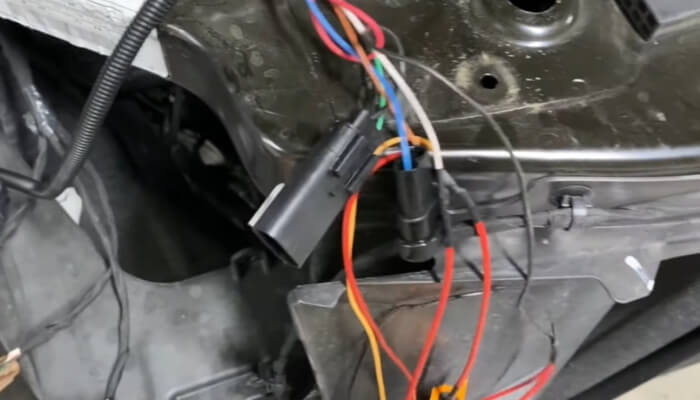
- Loose or corroded connections: Check the wiring connections leading to the headlights to ensure they are secure and corrosion-free.
- Blown fuses: Fuses are protective devices that prevent electrical overloads in your vehicle. If a headlight fuse blows, the circuit breaks and the headlights won’t work. Check the fuse box and replace any blown fuses with the appropriate rating.
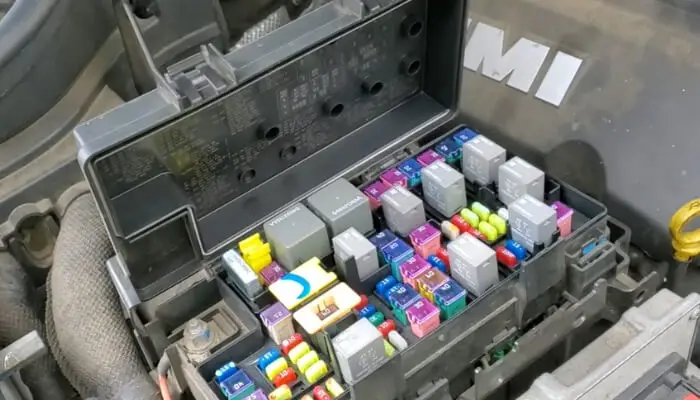
- Faulty wiring harness: Wiring harness problems can lead to various headlight malfunctions, including flickering, intermittent operation, or complete failure. A damaged wiring harness can disrupt the flow of electricity to the headlights, causing the issues mentioned above.
- Voltage issues: Use a voltage tester to measure if the headlights are receiving the proper voltage. If the voltage is too low, it may indicate an electrical problem.
Bulb Failure
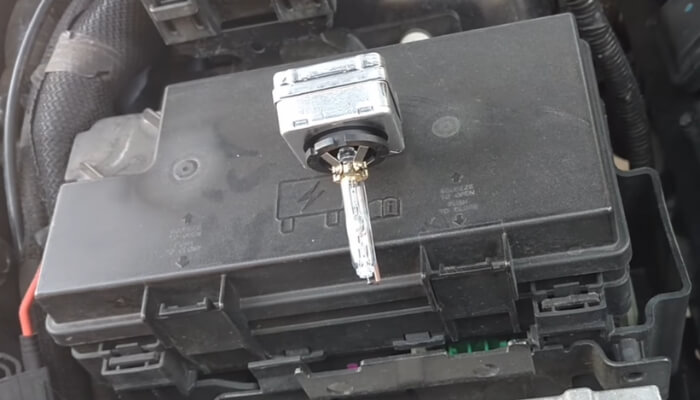
- Burned-out bulbs: Headlight bulbs can burn out and require replacement over time. Check the bulbs for any signs of damage or darkness and replace them if necessary.
- Incorrectly installed bulbs: Ensure that the bulbs are installed properly, ensuring they are securely seated and properly aligned.
- Water damage: Water infiltration into the headlight assembly can cause bulbs to fail. Inspect the assembly for any signs of water entry and address any leaks promptly.
Faulty Switch Or Relay
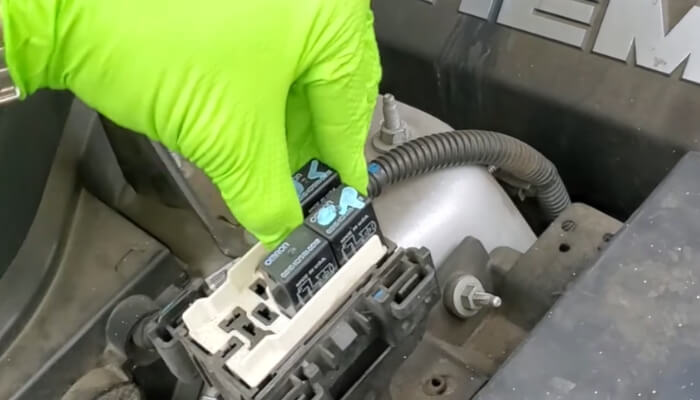
- Defective headlight switch: A malfunctioning headlight switch can prevent the headlights from turning on. Check the switch for any signs of damage or wear, and consider replacing it if needed.
- Bad relay: A faulty relay can disrupt the flow of electricity to the headlights. Test the relays associated with the headlights and replace any that are not functioning correctly.
Dim Headlights
Dim headlights are often a result of a faulty electrical connection, worn-out bulbs, or a failing alternator. Dim headlights can significantly reduce your visibility during nighttime driving, posing potential safety risks.
To address this problem, first, check the headlight bulbs for signs of discoloration or damage. If the bulbs seem fine, inspect the wiring and connections for any loose or corroded parts. Replacing the bulbs or fixing the electrical connections can restore your headlights’ brightness.
Flickering Headlights
Flickering headlights are commonly caused by a loose connection between the bulbs and the headlight assembly. Another possible culprit is a faulty voltage regulator, which affects the power supply to the headlights. Flickering headlights can be an annoying and distracting issue while driving.
If necessary, tightening the connections and replacing the voltage regulator can resolve this issue and provide stable illumination.
Moisture Buildup
Moisture buildup inside the headlight assembly can be a common issue in the Jeep Grand Cherokee. It is often a result of a faulty seal or gasket that allows water to seep into the headlight assembly.
To fix this, carefully remove the headlight assembly, clean the interior, and replace any damaged gaskets or seals. Applying a silicone sealant layer around the assembly’s edges can provide added protection against moisture.
Remember, if you are unsure or unable to diagnose the issue yourself, it’s always a good idea to consult a professional mechanic or technician specialising in automotive electrical systems. They have the expertise and tools to pinpoint and resolve the problem with your Jeep Grand Cherokee headlights.
Also Read: Why Jeep Headlights Not Working? (Causes With Solutions)
Troubleshooting Steps For Jeep Grand Cherokee Headlights Not Working
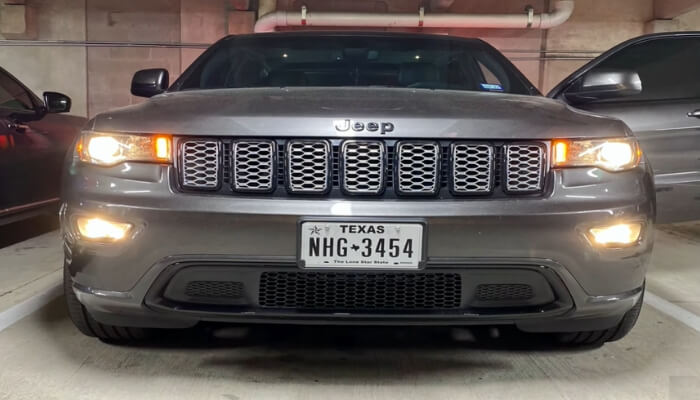
If your Jeep Grand Cherokee headlights are not working, follow these troubleshooting steps to resolve the issue quickly. Check the fuses, bulbs, wiring, and the headlight switch for any potential problems.
Checking The Fuse Box
- Start by locating the fuse box, which is typically found under the dashboard on the driver’s side.
- Carefully remove the cover and inspect the fuses related to the headlights.
- Look for any blown fuses; a broken filament inside the fuse indicates it needs to be replaced.
- If you find a blown fuse, replace it with a new one of the same amperage rating.
Inspecting Wiring Connections
- Ensure that the wiring connections for the headlights are secure and free from any damage or corrosion.
- Disconnect and reconnect each wiring connection to eliminate any potential loose connections.
- Use a multimeter to test the continuity of the wiring, ensuring there are no breaks or shorts.
Testing The Headlight Bulbs
- Remove the headlight bulb by following the instructions in your vehicle’s owner’s manual.
- Visually inspect the bulb for any signs of damage, such as a broken filament or discoloration.
- If you suspect a faulty bulb, replace it with a new one compatible with your Jeep Grand Cherokee model.
- Remember to handle the new bulb with clean hands to avoid contamination.
Verifying The Functionality Of The Switch Or Relay
- Turn the headlights on and off to see if they respond accordingly.
- If the headlights don’t turn on or flicker, the switch may be faulty and might need to be replaced.
- Locate the headlight relay, usually found in the engine compartment fuse box.
- Swap the headlight relay with a similar one from a different system, like the horn or windshield wipers, to test if the relay is the issue.
Remember, these troubleshooting steps are meant to help diagnose and potentially fix the problem with your Jeep Grand Cherokee’s headlights. If after following these steps, the issue persists, it may be time to seek professional assistance from a qualified mechanic or dealership technician.
Diy Solutions For Fixing Jeep Grand Cherokee Headlights Not Working
If you’re facing the frustrating issue of your Jeep Grand Cherokee headlights not working, don’t worry; you can try several DIY solutions before seeking professional help. Below, we’ll outline three common culprits and provide step-by-step instructions on how to address them.
Replacing Faulty Bulbs
If your Jeep Grand Cherokee headlights don’t illuminate, it’s possible that the bulbs have burned out. Here’s how you can replace them:
- Start by opening your vehicle’s hood and locating the front headlight assembly.
- Gently twist the headlight cover counterclockwise to remove it and gain access to the bulb.
- Disconnect the wiring harness from the back of the bulb.
- Carefully remove the old bulb by twisting it counterclockwise and pulling it out.
- Insert the new bulb and secure it by twisting it clockwise.
- Reconnect the wiring harness to the back of the new bulb.
- Place the headlight cover back in position and secure it by twisting it clockwise.
- Repeat the process for the other headlight if necessary.
Repairing Or Replacing Wiring Connections
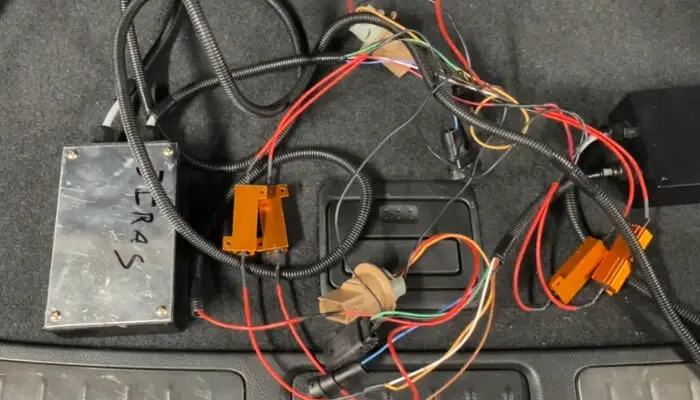
Faulty wiring connections can also cause your Jeep Grand Cherokee headlights to not work. Follow these steps to address this issue:
- Turn off your vehicle and disconnect the battery for safety.
- Inspect the wiring connections behind the headlight assembly and look for any loose or damaged wires.
- If you find any loose connections, reconnect them firmly.
- If there are damaged wires, you may need to repair or replace them. Use electrical tape or wire splicing tools to mend broken wires. If the damage is severe, consider replacing the wiring altogether.
Repairing Or Replacing The Switch Or Relay
If your Jeep Grand Cherokee headlights still refuse to work after checking and replacing the bulbs and repairing wiring connections, the issue may lie with the switch or relay. Follow these steps to troubleshoot:
- Locate the headlight switch on your dashboard and check if it’s in the correct position for the headlights to be active.
- If the switch seems fine, you must inspect the headlight relay. Refer to your vehicle’s manual to find the relay’s exact location.
- Once you locate the relay, try swapping it with a known working relay of the same type from another part of your Jeep, such as the horn or windshield wipers.
- If the headlights work with the swapped relay, it indicates a faulty relay that needs replacement.
- However, if the headlights still don’t function after swapping the relay, it’s best to consult a professional technician for further diagnosis.
Remember, before attempting any DIY solutions, it’s crucial to refer to your Jeep Grand Cherokee’s manual for specific instructions and safety precautions. By following the steps outlined above, you may be able to fix the issue of your headlights not working and get back on the road safely.
Seeking Professional Help For Jeep Grand Cherokee Headlights Not Working
If you’re experiencing issues with your Jeep Grand Cherokee headlights not working, seeking professional help is essential. While some problems can be fixed with DIY solutions, there are instances where the expertise of a mechanic is required. Here’s when you should consider consulting a professional:
When To Consult A Mechanic
Consider reaching out to a mechanic if:
- Your headlights are completely non-operational: If your Jeep Grand Cherokee headlights are not turning on at all, it could indicate a more significant electrical issue. A mechanic can diagnose the problem and provide the necessary repairs.
- Multiple attempts at fixing the problem have failed: If you’ve attempted various troubleshooting methods without success, it’s time to seek professional help. An experienced mechanic can assess the situation and determine the root cause of the headlight malfunction.
- There are additional electrical issues: If you notice other electrical problems occurring simultaneously with the headlight issue, it may indicate a complex wiring problem. Consulting a professional can help avoid further damage and ensure a thorough diagnosis.
- Limited automotive knowledge or experience: If you don’t possess the necessary automotive expertise or experience to handle complex electrical work, it’s best to consult a mechanic specializing in Jeep Grand Cherokee vehicles.
- You are unsure of the problem’s cause: If you’re uncertain about the underlying cause of the headlight issue, it’s wise to consult a professional. They can conduct a detailed inspection to identify the source of the problem and recommend appropriate solutions.
Finding A Trusted Professional
Finding the right mechanic to address your Jeep Grand Cherokee headlight issue. Consider the following when seeking a trusted professional:
- Check qualifications and certifications: Look for certified mechanics with experience working on Jeep Grand Cherokee vehicles. This ensures they have the necessary expertise to handle your headlight problem effectively.
- Read reviews and ask for recommendations: Look for reviews and testimonials online to gauge the quality of service different mechanics provide. Ask friends, family, or fellow Jeep Grand Cherokee owners for recommendations.
- Inquire about warranty and guarantees: A reputable mechanic often offers warranties or guarantees on their work. This provides peace of mind knowing that they stand behind their services and are committed to rectifying any issues that may arise.
- Request a detailed estimate: Before proceeding with any repairs, ask for a detailed estimate that outlines the costs involved. This lets you compare prices and choose a mechanic that fits your budget while offering quality workmanship.
- Communicate clearly: When visiting the mechanic, clearly explain the headlight issue you’re experiencing and any relevant symptoms. Providing accurate information will help the mechanic diagnose the problem more effectively.
By seeking professional help and finding a trusted mechanic, you can efficiently resolve your Jeep Grand Cherokee headlight issues and ensure optimal visibility on the road.

Credit: www.carscoops.com
Tips For Preventing Jeep Grand Cherokee Headlights Not Working
It can be frustrating when your Jeep Grand Cherokee headlights suddenly stop working. Not only can it impact your ability to see the road at night, but it also compromises your safety. Fortunately, you can take steps to prevent this issue from occurring.
By following these tips, you can maintain the functionality of your headlights and ensure a smooth driving experience.
Regular Maintenance And Inspection
- Inspect your headlights regularly: Take a few moments each month to visually inspect your headlights for any signs of damage or wear.
- Clean your headlights: Maintain the clarity of your headlights by cleaning them regularly. Use a soft cloth and mild soap to remove dirt, debris, and oxidation.
- Check the connections: Ensure the wiring connecting your headlights is secure and corrosion-free. Loose or corroded connections can cause electrical issues and malfunction in your headlights.
- Replace faulty components: If you notice any damaged or faulty components during your inspection, such as cracked lenses or burned-out bulbs, replace them promptly to avoid further problems.
Upgrading To High-Quality Bulbs
- Choose high-quality bulbs: Investing in high-quality bulbs enhances visibility and ensures longevity. Look for bulbs that have a longer lifespan and a brighter output. LED or HID bulbs are popular options known for their superior performance.
- Consider color temperature: Different bulbs have varying color temperatures affecting light output. Opt for bulbs with a color temperature that suits your preferences and provides optimal visibility on the road.
Being Mindful Of Electrical Issues
- Monitor your electrical system: Pay attention to any signs of electrical issues in your Jeep Grand Cherokee, such as flickering headlights or dimming lights. These can indicate underlying problems that need to be addressed promptly.
- Avoid overloading your electrical system: Remember the power requirements of any additional accessories you install. Overloading your electrical system can strain the circuit and lead to headlight malfunctions.
- Seek professional help: If you encounter persistent headlight issues or are unsure how to handle electrical problems, it’s best to consult a certified mechanic or seek assistance from your Jeep dealership. They can diagnose the problem and provide the necessary repairs.
By following these preventive measures and being proactive with maintenance and inspection, you can significantly reduce the risk of your Jeep Grand Cherokee headlights not working.
Taking care of your headlights not only ensures your safety but also enhances your driving experience, allowing you to navigate the roads with confidence, day or night.
Wrapping Up
To troubleshoot your Jeep Grand Cherokee headlights not working, start by checking the bulbs, fuses, and wiring connections. Ensure there are no loose or damaged wires. If everything appears to be in order, it may be a faulty headlight switch or a problem with the headlight control module.
Consider seeking professional assistance in diagnosing and addressing these issues. Remember to consult the Jeep Grand Cherokee’s user manual for specific details on the headlight system. Regular maintenance and inspections can help prevent these problems in the future. Keep in mind that headlights are essential for your safety and the safety of others on the road.
So, if you’re experiencing headlight issues, it’s crucial to address them promptly.
FAQs On Jeep Grand Cherokee Headlights Not Working
How often should I inspect my Jeep Grand Cherokee headlights?
It’s recommended to inspect your headlights regularly, at least once a month, to ensure they are functioning correctly and to spot any potential issues early on.
Can I replace a headlight bulb myself?
Yes, most headlight bulbs are relatively easy to replace, and you can find step-by-step guides in your Jeep Grand Cherokee owner’s manual. However, if you’re unsure, it’s best to seek professional assistance.
How do I know if my headlight switch is faulty?
If your headlights are not turning on or are behaving erratically, the headlight switch may be the culprit. Check for any signs of damage or wear on the switch itself.
Additionally, test the switch by turning it on and off to see if the headlights respond accordingly. If the switch is unresponsive or shows signs of damage, it’s time for a replacement.
Are LED headlights better than halogen for my Jeep Grand Cherokee?
LED headlights offer better visibility and longevity compared to halogen bulbs. Consider upgrading to LED headlights for improved performance.
Can I prevent moisture buildup in my headlights?
While it’s challenging to completely prevent moisture buildup, you can take some preventive measures. Ensure that the headlight assembly is sealed correctly after bulb replacement or any maintenance work.
Additionally, avoid driving through deep water or high-pressure car washes that may force water into the headlight housing.
Are there any specific headlight cleaning products I should use?
You can use commercially available headlight cleaning kits or a mild soap and water solution to clean your headlights.
What Causes Both Headlights To Stop Working?
A blown fuse or a faulty headlight bulb can cause both headlights to stop working.
Why Are My Headlights Only Not Working?
Your headlights may not be working due to a blown bulb, faulty wiring, or a malfunctioning switch.
Can A Blown Fuse Cause Your Headlights Not To Work?
Yes, a blown fuse can prevent your headlights from working.
Why Is My Headlight Not Blown But Not Working?
If your headlight is not blown but not working, it could be due to a faulty connection or electrical issue.

